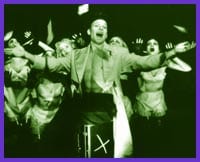One of the most chilling moments in the Sam Mendes revival of Cabaret comes late in the first act. The Emcee, garishly made-up with sequined nipples, eye shadow and platinum hair, crouches at centre stage, lit by a tight follow spot and holding an old Victrola. It plays a scratchy recording of a boy soprano sweetly singing the Nazi anthem “Tomorrow Belongs To Me.”
The Emcee is silent throughout, only joining in with the boy at the end, whispering, eerily, the final words, “to me.”
It’s a radically different rendition of the song than in earlier incarnations of the show – it was cabaret waiters belting it out in the 1966 Harold Prince Broadway production and rosy-cheeked Aryan picnickers singing it in the 1972 Bob Fosse film – but then this is a radically different, much darker and raunchier, Cabaret.
Set in Berlin, just as the Weimar Republic is about to give way to the Third Reich, Clifford Bradshaw (Rick Holmes), an US novelist and repressed homosexual, falls for Sally Bowles (Joely Fisher), a British party girl and singer at the sleazy Kit Kat Club who is willfully oblivious to Germany’s rising fascism.
Meanwhile, Cliff’s landlady, Fraulein Schneider (Alma Cuervo), has her otherwise disappointing life made briefly beautiful by the attentions of Herr Schultz (Hal Robinson), a Jewish grocer.
Cabaret’s fabulous standards by Kander and Ebb (“Wilkommen,” “Mein Herr,” “Cabaret”) are intact, but subject to more ominous interpretations. While earlier versions of the musical went in for bouncy show stoppers, Mendes’s Cabaret, first staged by his Donmar Warehouse theatre company in England in 1993, aims to trouble and implicate the audience, rather than just entertain it.
With brilliant economy in cast and staging, the sexually omnivorous Kit Kat chorus girls and boys also make up the band, so they are constantly in motion, dancing, singing, playing instruments or moving props. Gaunt and drug-addled in tattered clothes, track marks and bruises, they lurch menacingly through their numbers, while the Emcee, with a cod-piece attached to his suspenders and a swastika tattooed to his bum, smirks: “In here, life is beautiful. The girls are beautiful, even the orchestra is beautiful.”
Almost always in view, either performing or watching the action, the Emcee, as he is brilliantly realized by Norbert Leo Butz, is the utterly amoral moral conscience of the show, the only character who can see the eventual outcome of the growing Nazi movement. He lures the audience into troubling places – satirizing anti-Semitism in the number “If You Could See Her With My Eyes” or giving Nazism sex appeal – then disdains the audience for falling for it.
Next to the complexity of the Emcee, the other characters seem more stereotypes than individuals: the idealistic American, the jaded ex-pat, the hapless Jew, the apathetic German. As Sally, Fisher displays impressive pipes, with a haunting, almost spoken word rendition of Cabaret’s title number, but a wobbly British accent undermines her performance. Holmes does the best he can in the undeveloped role of Cliff, whose sexual interest in men is never resolved.
But then this musical really isn’t primarily about its star-crossed lovers. It’s most compelling, even haunting, when it poses its central moral dilemma. If it were, as Cliff notes in his final reminiscence, the end of the world, would you, too, be dancing with Sally Bowles?
$26.50-$93.
Till Sat, Oct 16.
Princess Of Wales Theatre.
300 King St W.
(416) 872-1212.


 Why you can trust Xtra
Why you can trust Xtra


